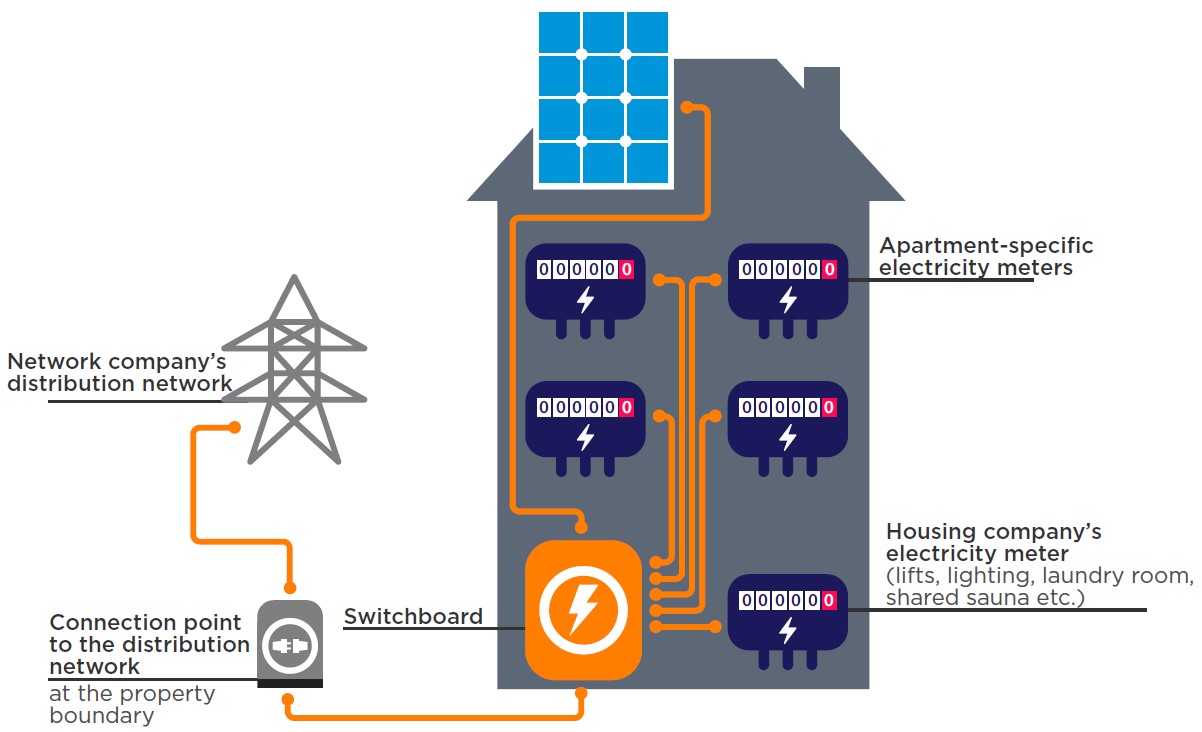SPARCS policy dialogue in Espoo on Energy Communities
Image: Energy Community within a Housing Company
(Courtesy of Finnish Ministry of Economic Affairs and Employment, Energy, Publication 39/2018)
In spite of long and dark winters, solar energy is a promising solution even in Finnish climates. Excellent scalability, easy integration into urban roofs and facades, and promising cost efficiency makes solar energy and photovoltaics, in particular, a key solution for Positive Energy Districts.
Finland does not promote rooftop PV systems for households with specific incentives like feed-in tariffs or net metering. This makes PV system sizing a complicated task, since any production that exceeds self-consumption is fed into the grid with little financial reward.
More than half of the Finnish population lives in Housing Companies, where each shareholder hold title to one apartment within the Company. Households within the Housing Company do not directly benefit from the rooftop solar system, as the power would flow to the apartments through utility meters and thus distribution tariff, electricity tax and VAT are applied. This makes most rooftop PV installations in Housing Companies unfeasible, leaving half the Finnish population without the opportunity to benefit from inexpensive solar energy.
New directives by the European Commission will change this in the course of 2020. All power consumers within one plot are allowed to establish Energy Communities and share collectively produced electricity among the Community members. This will boost the uptake of rooftop solar significantly. However, new legislation must not add undue bureaucratic barriers, like the Mieterstrom law did in Germany. Cities should engage in the legislation process to ensure new regulation is fit for purpose from the citizens’ perspective.
In March, the SPARCS team in Espoo identified an opportunity to engage with the Ministry of Economic Affairs and Employment and participate in drafting the law. Official statements to the draft are formally requested by an online portal, and in this case the public had 2 weeks time to submit their response. As the SPARCS team includes both city representatives and technical experts from VTT, a joint statement was proposed.
A Task Force within the SPARCS team in Espoo discussed the contents of the draft and possible concerns to be raised. In result, both the formal statement and a report on this policy dialogue process were prepared. As this is a new function for city administration, the timeline proved to be too challenging to acquire necessary clearance. The expertise on technical details, as well as authority to make statement on behalf of the city, are distributed among different departments and cooperation processes are not streamlined.
Electricity has historically been considered an industrial issue, generated in remote industrial-scale power plants and consumed mostly in large energy-intensive factories. The energy transition, however, introduces attractive options for distributed renewable generation and self-consumption. More active policy dialogue by cities will ensure that legislation on energy also benefits citizen-centered solutions in urban contexts.

